New concerto jumps from Philly to D.C. to QC
While just about every Quad City Symphony Orchestra concert is special, the final Masterworks program of this season is extra special for several reasons.
Sandwiched between two 19th-century titans – the Brahms Tragic Overture and Tchaikovsky’s Symphony No. 4 – is a 21st-century wunderkind. The prolific Moline composer Jacob Bancks, associate professor of music at Augustana College, will have his new Clarinet Concerto premiered in his hometown, Saturday, April 6, and Sunday, April 7.
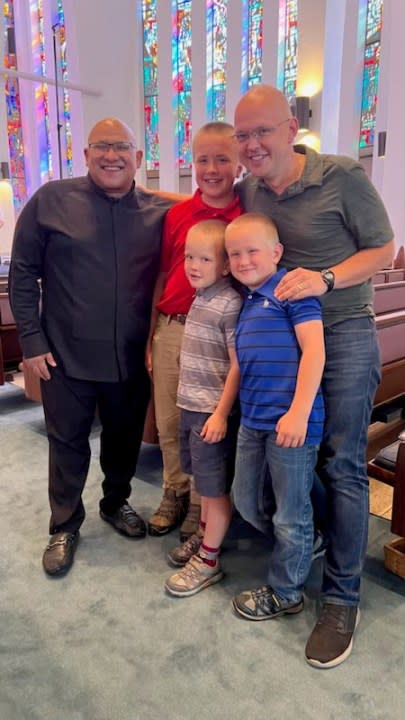
This will not be a world premiere, since the 25-minute work was co-commissioned by QCSO and two other high-powered culture forces – The Philadelphia Orchestra and The United States Marine Band.
It was given its first performance Nov. 11, 2021 by Ricardo Morales, principal clarinetist for the Philly group, who will make his QCSO debut playing it here.
Morales, a 52-year-old native of San Juan, Puerto Rico, met Bancks, now 42, in 2017, when the clarinetist was soloist in premiering another concerto, by Jonathan Leshnoff, commissioned for him by the Philadelphia Orchestra. On the U.S. Marine Band program was also Bancks’s Occidental Symphony.
“We hit it off immediately. A few months later, I approached him to see if he was interested in collaborating, and the rest is history,” the composer said Tuesday by email.
“I was taken aback by how interesting and beautiful and colorful and cool the piece was. I was like, wow, I really, really liked it,” Morales said of the symphony in a Tuesday morning phone interview. “We basically hit it off right away and he has such a great personality, and we were discussing music and we share so many musical values.”
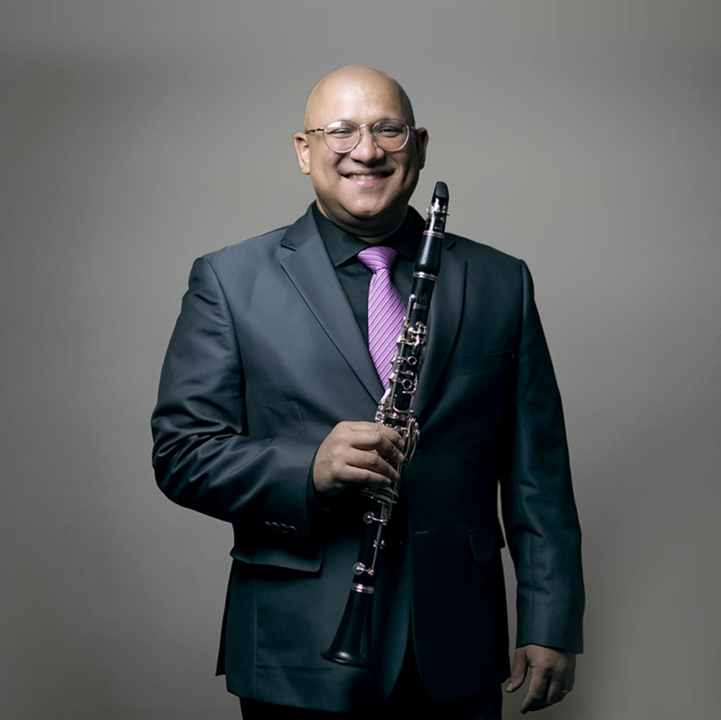
Morales said it’s always a great privilege to premiere a piece and work with a composer.
“My responsibility as a musician basically is to recreate what the composer has in mind, right? And the composer wants to have their work performed and fulfill their artistic needs,” he said. “That’s why it’s very important to be able to meet eye to eye so to speak.”
As one of America’s most storied and prestigious orchestras, Philadelphia also has strongly supported new works, Morales said.
“Jacob also did his homework. He actually came to some concerts to hear the orchestra and to hear me play in the orchestra and to hear me solo with a different piece with the Philadelphia Orchestra,” he said.
“It was very well thought out, then he could have the full lay of the land, so to speak. It was quite wonderful and he was able to talk to some of the players there,” Morales said. “It is very, very personal and it’s just a wonderful, wonderful experience to be able to do that on a new piece. I feel very lucky that the piece is wonderful and full of life and beauty.”
“Many concertos, especially older ones, are all about the soloist, with relatively nondescript accompaniment in the orchestra,” Bancks said. “I knew that I wanted to avoid this, but the opposite danger is making the orchestral parts so flashy that the soloist gets buried. Thankfully Ricardo is an exceptionally bold player, and the other musicians participating in the co-commission are all very sensitive accompanists.”

Bancks first heard Morales play in the early 2000s when he and his future wife Kara visited the Metropolitan Opera in New York City, where Ricardo was principal clarinetist.
“Kara is a gifted clarinetist herself, so she made sure I paid attention to the outstanding clarinetist in the pit,” Bancks wrote for the QCSO program. “We were both incredibly moved and impressed by his dramatic, bold, and elegant playing. Like a top-notch singer, Ricardo filled that huge hall with rich sound, playing with impeccable technique and almost-miraculous musical sensitivity.”
“Once we knew we were going to be working together, I took a trip to Philly to hear Ricardo play Weber’s second concerto with the orchestra,” Bancks said by email. “I learned and absorbed so much from hearing those rehearsals and performances, so once we were working on the concerto it was easy to work with Ricardo remotely. He’s a great texter, and I’ve grown very accustomed to listening to him play over the phone.
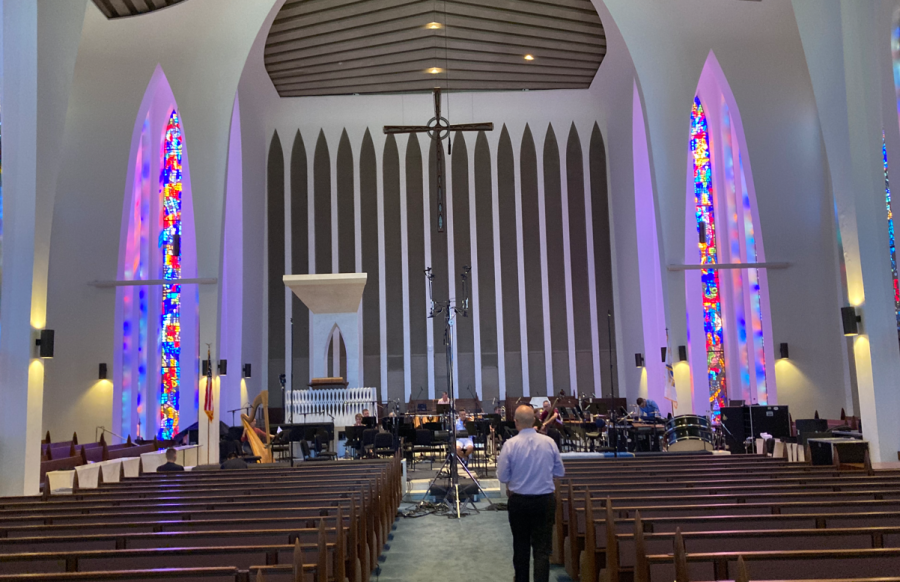
“The two things I admire most about Ricardo’s playing are his profound sense of line in lyrical passages, and his control of articulation in technical ones,” the composer (who’s been commissioned by the QCSO before and writes its program notes) said. “In this sense, I hear his playing as extremely operatic, and the concerto includes lots of operatic elements.”
Bancks said penning the Clarinet Concerto was truly collaborative and also produced a close friendship between the two bald, gregarious musicians.
“I didn’t really know what to expect; I’ve met my fair share of well-known musicians who aren’t all that friendly or interesting in person. But as it turned out, Ricardo is not only a great musician, he’s also a great guy, and since we met during that concert week, he’s become a great friend,” he wrote.
Rave reviews
To say the concerto – performed in January 2022 by the Marine Band Chamber Orchestra and then this past February in Olympia, Wash. – was well-received is an understatement.
“It’s an amiable work — frisky, colorful, voluble, and written in a direct musical style that sometimes suggests the hand of a Francophile,” The Philadelphia Inquirer critic wrote. “It’s high-energy stuff, and that aspect of the piece gave soloist Ricardo Morales plenty of ways to highlight his superior technical firepower.
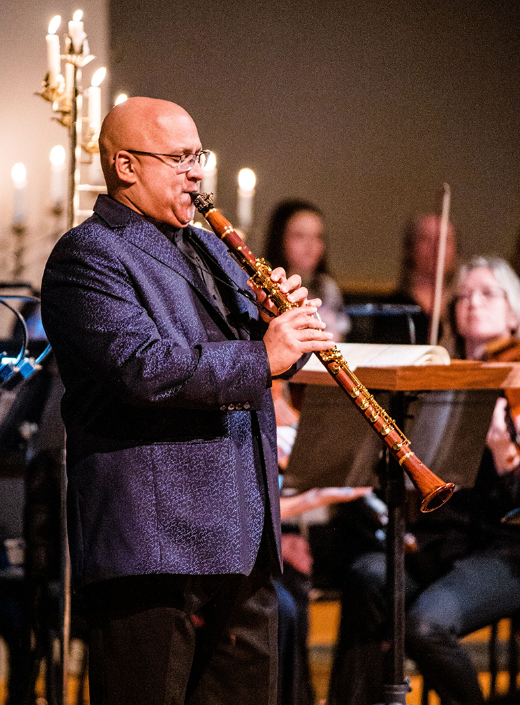
“But it was the more lyrical sections that caught my ear, and Morales carried these moments beautifully. There was a lovely back-and-forth between the solo clarinetist and flutist Patrick Williams, a dreamy aspect to the second movement, and a third movement that suggested, in the best sense, a movie score. In a concerto, the soloist may be the hero, but this is a concerto that knows that when it comes to visiting magical places, it’s only the orchestra that can bring you along.”
The concerto is divided into three movements played without interruption: “Unruly,” “Tender” and “Defiant.”
“The orchestration is colorful, with an array of percussion that includes bongos, vibraphone, high-hat and brake drum (yes, the car part, struck with mallets),” the Wall Street Journal wrote of the 2021 premiere.
“The character of the solo clarinet part, which contains a number of extended trills and ad lib passages, changes frequently, with instructions in the score running the gamut from ‘with swagger’ and ‘lonely’ to ‘stealthy,’” the review said. “But unlike traditional concertos, where soloist and orchestra often alternate time in the spotlight, Mr. Bancks’s work requires Mr. Morales to play almost nonstop with the orchestra or in smaller chamber-music groupings of colleagues.
“His breaks are usually short, his unaccompanied passages mostly brief. The clarinetist met this physical challenge with his customary fluidity and admirable expressivity,” the Journal said.
A review at broadstreetreview.com said: “Across three movements that unspool in a single, unbroken stream, Morales shifted effortlessly from punchy staccato notes to luscious legato, which devolved often into bebop-like distortions of melody.
“He handled everything the composer threw at him with absolute poise, but more importantly, he produced a truly gorgeous sound, chestnut-colored and pliable to the music’s needs,” the review said of Morales. “Rather than traditional markings, Bancks gave each of the movements a title. The inner movement, ‘Tender,’ is the most distinctive, with Morales’s mellow sound soaring above a cascade of shimmering, almost Straussian strings.”
The Marine Band connection
Bancks has written a total of three times for the Marine Band (called “The President’s Own,” founded in 1798 by President John Adams. and plays every presidential inaugural), twice for the big band and once for the chamber orchestra.
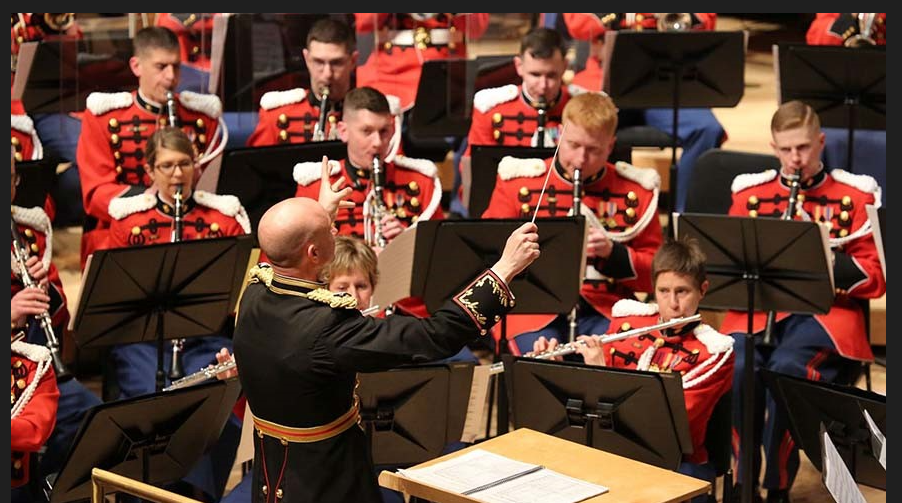
“In my experience, Marine Band members are among the most talented and generous musicians alive. Your tax dollars at work!” he said.
In his final hours as director of the Marine Band, Colonel Jason Fettig “moved heaven and earth to make a studio recording of the concerto as his last recording project,” Bancks said of the 2023 album, Aspire: The President’s Own at 225.
Bancks traveled with a few of his kids to Washington, D.C. this past September to participate in the recording session at National Presbyterian Church.
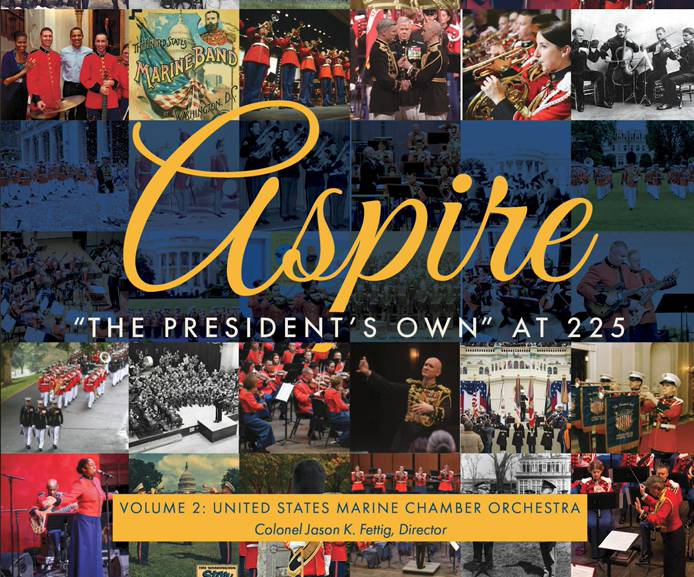
“It was just such an honor to have first-rate conductors, instrumentalists, and recording engineers going over my work with a digital fine-tooth comb,” the composer said. “I write extremely detailed scores, and sometimes I wonder if being so specific with my notation is worth the time. In this case, it definitely was, since the recording vividly captured so many details.”
You can watch the Marine Band perform the concerto on YouTube HERE.
A long wait for QC concerts
Throughout this long process, Bancks has been hotly anticipating the QCSO performances.
“It’s one thing to create a new work, refine it through several performances, and share it with various live and online audiences. It’s another thing entirely to bring that work home, to hear it prepared by the musicians whose playing I have the privilege of admiring so often, and to present it in my own community to family, friends and neighbors,” he wrote for the program.
Bancks thanked music director Mark Russell Smith for “his generosity in sharing his amazing artistry; to the rest of the QCSO musicians for their beautiful playing (sorry about all those tricky passages!); and to executive director Brian Baxter for his support and advocacy for my work, and for never being mad when my program notes are submitted after the deadline,” the program says.
“Scheduling is always a challenge for ensembles, so it’s not unusual to have to wait for a performance like this,” Bancks said Tuesday. “As lead commissioner, Philly was always going to host the world premiere, and with that delayed to 2021-22, everything else got moved back too. I’m actually very pleased that my hometown premiere is so late into the process.
“Ricardo has had several years to play and record the piece in various contexts, so his interpretation of the solo part has really matured and deepened since the premiere,” he added.
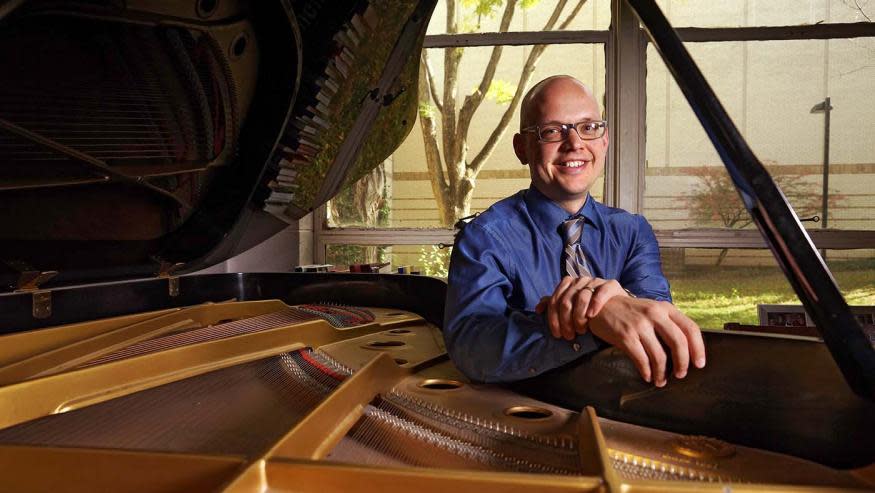
To have to wait for the QC premiere is “delayed gratification,” Morales said, but has been beneficial for the performer.
“I have been so happy because the more opportunity I have to play it, the more I love it,” he said. “I thought I just loved it in the beginning, but it’s very clear to me. So it’s great. I’m totally excited to play it in the Quad Cities.”
An impressive career
Morales began his studies at the Escuela Libre de Musica and continued as a teen at the Cincinnati Conservatory of Music and Indiana University, where he received his Artist Diploma. After performing with the Florida Symphony in Orlando, he began a 10-year tenure with the Metropolitan Opera Orchestra at age 21.
He made his solo debut with The Philadelphia Orchestra in 2004 (he’s been principal clarinetist since 2003) and has since performed as soloist on many occasions.
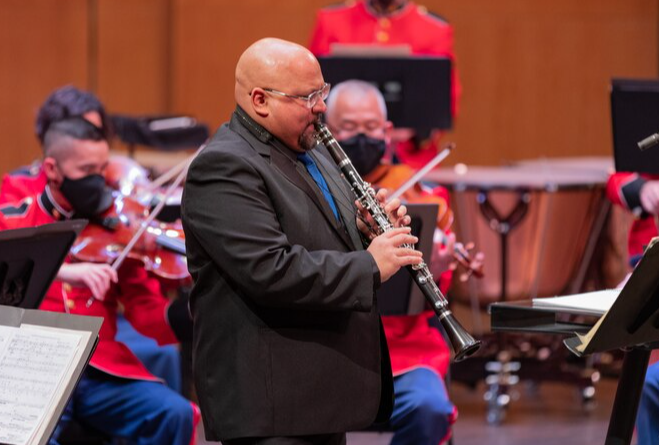
He’s also collaborated with Christoph Eschenbach, André Watts, Emanuel Ax, Jean-Yves Thibaudet, Gil Shaham, and Kathleen Battle. Morales is highly sought after for his recitals and master classes, which have taken him throughout North America, Europe and Asia. In addition, he currently serves on the faculty of Temple University, Philadelphia.
Morales got to play the iconic “Rhapsody in Blue” (clarinet has a key role at the start) in January 2024 at Carnegie Hall in honor of the work’s 100th anniversary.
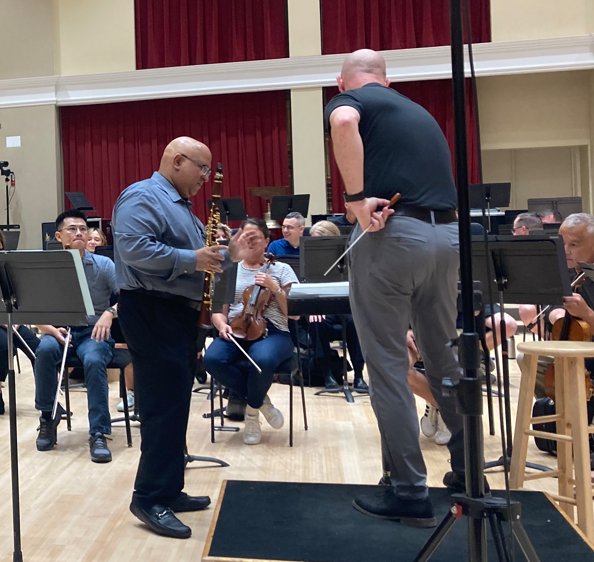
“It is fun to play. It’s one that it seems like fun, during the rehearsal it’s always fun, but during the concert — since everybody knows — it instead is kind of nerve-wracking,” he said.
For more information on Morales, click HERE. For tickets to the April 6-7 concerts, visit the QCSO website HERE.
For the latest news, weather, sports, and streaming video, head to WHBF - OurQuadCities.com.

